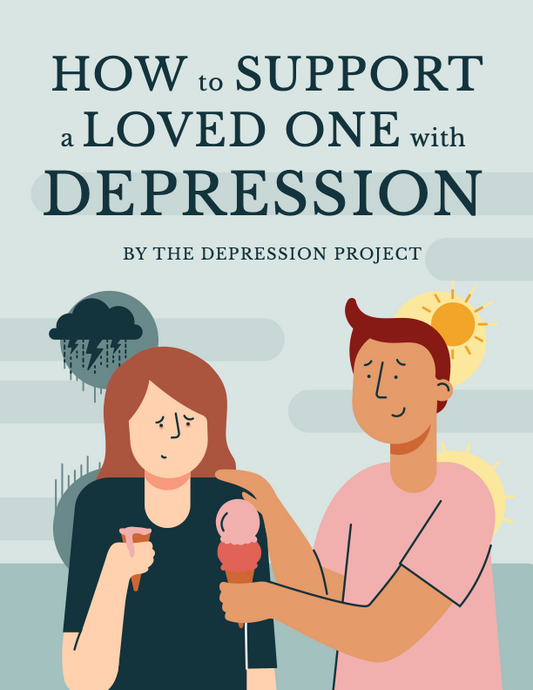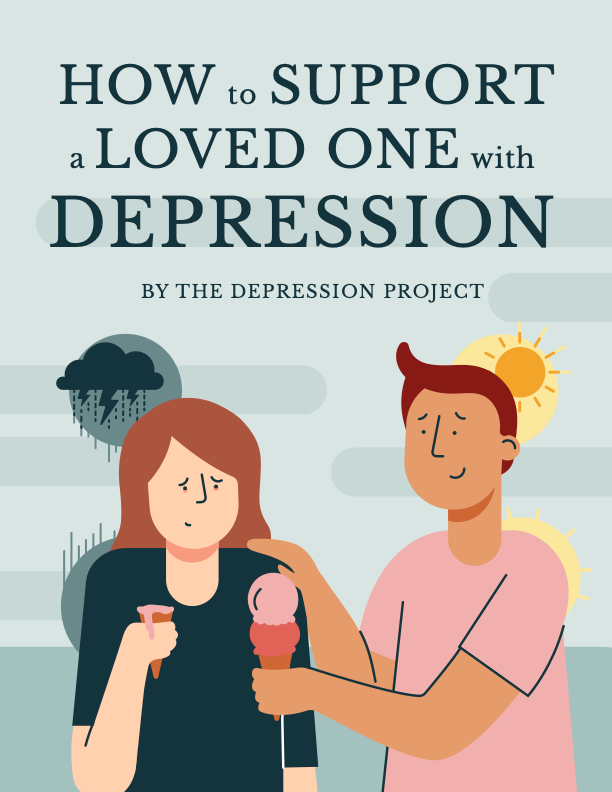
How To Support A Loved One With Depression
At The Depression Project, we've observed that for two main reasons, many people with depression tragically don’t receive anywhere near the amount of support they need.
Firstly, it’s common for non-sufferers to confuse depression with “just a bad day”, or to dismiss it as a non-problem that’s simple to fix. This then results in them telling their loved one with depression things like:
- “Depression isn’t real.”
- “Just get over it."
- “You have a mental illness? Then you must be crazy!”
- “I know how you feel” (when that person has never had depression before).
- “We all have bad days now and then."
- “You can't be depressed – there are so many people in the world who are worse off than you!”
- “You’re just being negative."
- “It’s all in your head.”
- “Look how lucky you are.”
- “Just do XYZ – then you’ll be fine!”
- “Stop feeling sorry for yourself.”
And, while comments like these can be well-intentioned, they usually leave the person with depression feeling as if their illness hasn’t been understood or validated at all.
And, as a result, then far from feeling supported, that person instead feels lonely, abandoned, and even more miserable than they already were.
Secondly, even if someone does understand how devastating of an illness depression can be, they often still won’t know how to support their loved one through it.
Why?
Because depression can be so many different things at different times, and for this reason, it can be really difficult for a supporter to know how to help their loved one at any given moment.
For example:
- One day: Their loved one might feel so exhausted and miserable that they just want to lie in bed all day;
- Then the next day: They might feel pretty good;
- Then the day after that: They might feel a lot worse, but they try to carry on by faking a smile and pretending they're “fine”;
- Then the next two days: They might feel so tired and burned out from pretending to be OK that they just want to sleep and not talk to anyone;
- Then the day after that: They might want to talk to a friend and be supported;
- Then the day after that: They might actually feel fine, and not want to talk about or be reminded of their depression at all;
- Then the next two days after that: They might just be pretending that everything is fine, when deep down, they’re feeling miserable again.
When depression can be so many different things like so, it’s very difficult for a supporter to know how their loved one with depression feels at any particular point in time – and consequently, at any particular point in time, it’s very hard for that supporter to know how to help them.
For this reason, even with a supporter’s best intentions, their loved one with depression will often still end up feeling isolated, alone and bereft of support.
But fortunately, YOUR loved one with depression will not feel lonely, misunderstood or unsupported!
Because, by the time you've finished reading How To Support A Loved One With Depression, you will not only properly understand depression, but you’ll also know how best to support your loved one through it – both in general terms, and at any given moment in time as well!
Here's exactly what you'll learn by reading this book:
- CHAPTER 1: The Six Most Important Things That People With Depression Wish You Would Know. Based on what members of The Depression Project’s 3,000,000+ person social media community have told us, we’ll break-down the six most important things that people with depression wish you would know – so that you have a clear, accurate understanding of this illness.
- CHAPTER 2: The Overarching Principles Of How To Support A Loved One With Depression. No matter how your loved one with depression feels at any given moment, there are certain “do’s” that will almost always be appreciated, and certain “don’ts” that will leave your loved one feeling frustrated, alienated, and even more miserable. So, in this chapter, we'll detail exactly what these “do’s” and “don’ts” are.
- CHAPTER 3: How To Support Your Loved One When They're In The "Storm Zone". Your loved one can be said to be in the "Storm Zone" of The Depression Project's Storm To Sun Framework when their depression is at its most severe - i.e., when it feels like there's a storm raging in their mind. And, in this chapter, we'll show you how best to support them when they're in this state.
- CHAPTER 4: How To Support Your Loved One When They're In The "Rain Zone". Your loved one is in the "Rain Zone" when at that moment, their depressive symptoms are "moderately severe". In this chapter, we'll show you how best to support them when they're in this state - as it's quite different from when they're in the Storm Zone.
- CHAPTER 5: How To Support Your Loved One When They're In The "Cloud Zone". This is when your loved one's symptoms are "mild" at present - and once again, the optimum way to support your loved one in the Cloud Zone is very, very different to when they're in the Storm or the Rain Zone.
FAQ #1: What format does this book come in?
This book is available in two different formats for you to choose from:
- PDF - for you to download and read instantly on any device you'd like (or to print it off and read it if you'd prefer).
-
Paperback (if you live in the US or Canada) - which will be delivered to you within 4-8 business days. Shipping costs are US$7.95 within the US and CAD$14 within Canada. This shipping cost is a flat rate, so whether you order one book, or multiple books, the shipping cost will be the same (if you would like to, you'll find the option to add one or more other books to your cart below so that you can save on shipping). Once your order has been shipped, you will be emailed a number so that you can track it.
FAQ #2: Why should you feel confident that this book will be really helpful?
This book was written by The Depression Project - which with 2,000,000+ followers on Instagram, 1,000,000+ on Facebook, and our posts having been viewed several BILLION times, is one of the world's most popular mental health organisations. We understand depression really, really well, and know exactly how to help people support their loved ones who are struggling with this illness.
FAQ#3: What if you give this book a try and you don't like it?
We're extremely, extremely confident that you're going to find How To Support A Loved One With Depression immensely helpful. But, just in case you don't, the PDF version of this book comes with a 60 Day, No-Questions-Asked, 100% Moneyback Guarantee!

Any Questions?
If you have any questions about How To Support A Loved One With Depression, then please feel free to click here and contact us so that someone from our friendly team can answer them for you :)
Otherwise, we hope you choose to get this book, because we know that you're going to find it really, really helpful!
All our love,
The Depression Project Team.
Format Options

